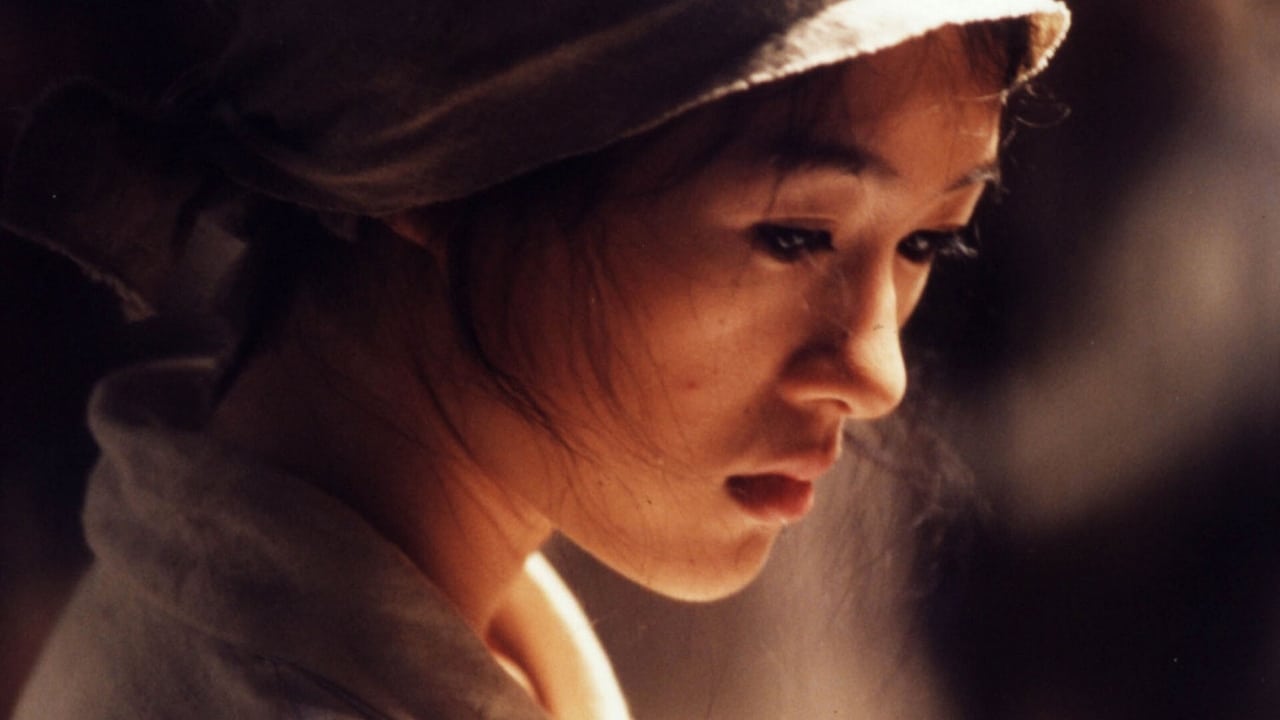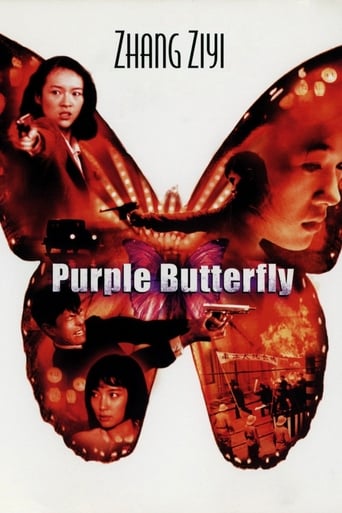



Absolutely Fantastic
All that we are seeing on the screen is happening with real people, real action sequences in the background, forcing the eye to watch as if we were there.
View MoreThe movie turns out to be a little better than the average. Starting from a romantic formula often seen in the cinema, it ends in the most predictable (and somewhat bland) way.
View MoreIt is an exhilarating, distressing, funny and profound film, with one of the more memorable film scores in years,
View MoreThere are a few things director Ye Lou likes more than I do: silent, open-mouthed screams, rain and quick dissolves. His movie Purple Butterfly is composed mainly of these things, with glimpses in-between of a story about two lovers caught up in the Japanese occupation of Manchuria during the '30s.I know what I'm supposed to think of this movie: it's a tone-poem, an evocation of some deeper mood, something running below the surface of the action. But I can't help feeling that the whole exercise would've been more worthwhile had the director demonstrated less ambition and more good old-fashioned story-sense.There are these two people, one a Chinese woman working for the underground, the other a Japanese fellow toiling for his country's secret-service. We know they're lovers because we see them in bed together, but for at least half the movie, we have no real idea who these people are, what their roles are in the drama that appears to be playing out before us. Now, I'm no dummy, and certainly don't require everything to be spelled-out for me in the dopey terms of most Hollywood movies, but I do appreciate it when the director makes at least a cursory effort at filling me in on the details of the story, like who people are and why I should care about them.The movie doesn't let you get a food-hold, it's too busy being poetic and rainy and surpassingly glum. This might be all right if the images had some great plastic beauty, but the blue-toned pictures Ye Lou puts in front of us, dissolving from one to the next like he's putting on a museum slide-show of Chinese history, are not exactly the best eye-candy I've seen lately. As an exercise in image and cutting the film is not hall-of-fame material.The stuff of good cinema is there in Purple Butterfly, but it's buried under too many layers of Cinema.
View MoreSaw Purple Butterfly in NYC the beginning of December. I missed Xiao cheng zhi chun or Springtime in a Small Town by director Tian Zhuangzhuang shown there in early May. Quite likely Springtime is the better movie of the two by a wide margin. It's based on an earlier Chinese film according to J. Hoberman of the Village Voice: "Fei Mu's 1948 Springtime is widely regarded as a masterpiece-some consider it the greatest of all Chinese films. Never having seen it, I can only imagine how Tian may have annotated the original in his remake. The second Springtime is predicated on a sense of '50s film-making (not unlike the heightened Sirkness of Todd Haynes's Far From Heaven) that could hardly have existed in the original. Even as homage, Tian's movie seems to be among the finest expressions of the Chinese new wave." Jonathan Rosenbaum describes the Fei Mu Springtime as "widely considered the nation's greatest film by Mandarin speakers but tragically neglected by almost everyone else" and ends his capsule review of the new Springtime, "This erotically charged drama may not be quite as great as the original, but it's an amazing and beautiful work just the same." I no doubt need to add this to my 2004 "Wish I'd Seen" list. (Thanks to my colleagues on another film world website for bringing it to my attention in the House of Flying Daggers thread there).Well, it's clear to me that Purple Butterfly isn't of this magnitude but it's notably different from the usual Chinese film fare in focusing on political conflicts in the 1930's -- which are handled in a somewhat conspiratorial and noirish way, with romance woven in. There are lots of long stares, Thirties dance songs, non-filter cigarettes pensively lighted with box matches, and events in Shanghai in the period of Japanese occupation leading up to the Sino-Japanese war involving political activist plots and counter-plots that are filmed to look rather like blurry, chaotic versions of Chicago gangster shootouts. There is a tragic star-crossed love story, and the climactic scene is rather neat. But the director, Lou Ye, isn't satisfied but has to add a disenchanted brutal sex/self doubt coda.The director's previous film was Suzhou River, and this is just as pretty to look at -- pretty enough so you almost don't care that at first you don't know what's happening, except that couples are inarticulately in love and it's always raining. The Village Voice thumbnail review aptly commented, "part action flick, part love story, and part posh historical pageant...a fabulously morose piece of work." Purple Butterfly calls a bit too much attention to itself to fully evoke its Thirties setting, but it manages to seem original most of the way despite occasional debts to Wong Kar Wai notable in the long pauses, languid love scenes, and incessant rain. Not a great success, but watchable as a mood piece.Metacritic score of Purple Butterfly: 66.Metacritic score of Springtime in a Small Town: 86.
View MorePurple Butterfly began in silence, a risky one at that. It relied on the gestures of the actors/actresses, the jumpcuts, and the hand-held camera-work, reminiscent of early Italian Neo-Realism and/or Cassevettes, to begin the story. I have to admit that I dozed off somewhere within the first 30 min., but that was mainly due to my lack of sleep. Nevertheless, I was anxious for the ending of the film.I enjoyed the cinematography, the acting style, the editing, the music, and the mixing of genres. It's like an epic espionage war love story, the likes of a collaboration between Hitchcock and Truffuat. There was some poetic scenes, and suspenseful ones as well. The main problem I had was the narrative structure which seemed confusing to me. It also didn't flow well together. Somewhere during the middle of the film, it becomes non-linear without warning me.In conclusion, I give the movie a B-. It is definitely worth seeing and may will be a very historic film in regards to its film language in years to come.
View More"Purple Butterfly" puts us in media res in a moment in history--the years leading up to the Second Sino-Japanese War--that may be unfamiliar to some viewers. It links the lives of several people tragically brought together with a time-scrambling plot, a device familiar from "Amores Perros." This combination may account for some of the impatience and confusion some viewers have expressed; but I found the film brilliant. I particularly liked the courageously (for Westerners)slow pace of many scenes--the scene at the railway station, where the protagonist (played by Zhang Ziyi) gradually moves from background to foreground, is especially good. Those looking for Hong Kong-style action will be disappointed. Those open to a humane, thoughtful twist on the intrigue genre will probably like it. Fans of Ms. Zhang from her martial arts films will have the opportunity to see her in a less stylized role.
View More